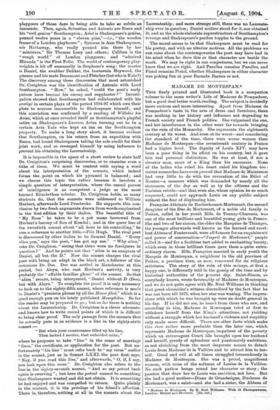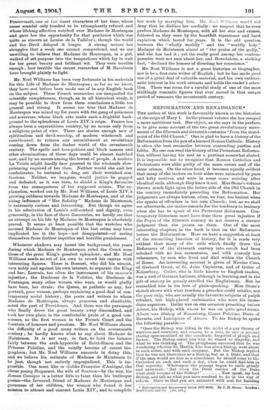THIS finely printed and illustrated book is a companion volume
to the same writer's Life of Madame de Pompadour, but a good deal better worth reading. The subject is decidedly more curious and more interesting. Apart from Madame de Pompadour's taste in the arts of dress and furniture, there was nothing in her history and influence not degrading to French society and French politics. She vulgarised the one, and her interference in the other went far towards bringing on the ruin of the Monarchy. She represents the eighteenth century at its worst. And even at its worst—and considering the standard of the time, there were worse women than Madame de Montespan—the seventeenth century in France had a higher level. The dignity of Louis XIV. may have been a poor thing in its effect on his country, but it gave him real personal distinction. He was at least, if not a cleverer man, more of a King than his successor. None of the ladies who ruled his heart ruled his kingdom too : recent researches have even proved that Madame de Maintenon had very little to do with the revocation of the Edict of Nantes—a measure which was demanded by nearly all the statesmen of the day as well as by the citizens and the Parisian rabble—and that even she, whose opinion he so much respected, could not approach Louis on any public subject without the fear of displeasing him.
Frangoise Athenals de Rochechouart-Mortemart, the second daughter of the Due de Mortemart, of a noble old family in Poitou, called in her youth Mlle. de Tonnay-Charente, was one of the most brilliant and beautiful young girls in France. She and two of her sisters, the elder the Marquise de Thianges, the younger afterwards well known as the learned and excel- lent Abbess of Fontevrault, were all famous for an exquisite wit and power of conversation—" /' esprit de Mortemart," people called it—and for a faultless tact added to enchanting beauty, which even in those brilliant times gave them a quite extra- ordinary charm. Mlle. Francoise married in early youth the Marquis de Montespan, a neighbour in the old province of Poitou, a province then, as now, renowned for its religious strictness. The story of the ruin of this menage, at first a happy one, is differently told in the gossip of the time and by historical authorities of the present day. Saint-Simon, as everybody knows, wrote favourably of Madame de Montespan, and we do not quite agree with Mr. Noel Williams in thinking that great chronicler's witness discredited by the fact that he was not born till 1675, when her star was waning. The impres- sions with which he was brought up were no doubt general in his day. If he did not see, he heard from those who saw, and according to him, Madame de Montespan tried at first to withdraw herself from the King's attentions, not yielding without a struggle which her husband's violence and stupidity only made more difficult. There are other facts which make this view rather more probable than the later one, which represents Madame de Montespan, impatient of the poverty which an extravagant Court life brought upon -her husband and herself, greedy of splendour and passionately ambitious, as not shrinking from the most desperate means to detach Louis from Madame de la Valliere and to attract him to her- self. Good and evil at all times struggled tremendously in Madame de Montespan. She was a proud, magnificent woman, with none of the softness of Louise de la Va,lliere. No such pathos hangs round her character or story ; the passion that drew her to Louis was ambition, not love. But she had a good mother—Diane de Grandseigne, Duchesse de Mortemart, was a saint—and she had a sister, the Abbess of • Madame de Montespan. By H. Noel Williams. With 16 Photogravures. London : Harper and Brothers. [25s. net.]
Fontevrault, one of the finest characters of her time, whose name scandal only touched to be triumphantly refuted, and whose lifelong affection watched over Madame de Montespan and gave her the opportunity for that penitence which was quite as sincere as Louise de la Valliere's, though the world and the Devil delayed it longer. A strong nature has struggles that a weak one cannot comprehend, and we are unwilling to believe that Madame de Montespan, as a girl, walked of set purpose into the temptations which lay in wait for her great beauty and brilliant wit. They were terrible enough : how terrible the recent researches of M. Ravaisson have brought plainly to light.
Mr. Noel Williams has been very fortunate in his materials for this Life of Madame de Montespan ; so far as we know, they have not before been made use of in any English book on the subject. These French researches are unequalled for scientific completeness, though, as in all historical study, it may be possible to draw from them conclusions a little too general and strong. It seems too true that Madame de Montespan was mixed up for years with the gang of poisoners and sorcerers whose black arts make such a frightful back- ground to the splendours of Louis XIV.'s reign. France has always been a superstitious country, by no means only from a religious point of view. There are stories enough now of spiritualism and devil-worship, of modern witchcraft and envoitement, to remove any astonishment at revelations coming down from the darker world of the seventeenth century. The spells and love-potions and black masses and other abominations of those days could be almost matched now, and by no means among the lowest of people. A modern La Voisin might hardly dare proceed to the wholesale slow- poisoning required of her then. Neither would she and her confederates he tortured to drag out their wretched con- fessions. Neither, we imagine, would justice be gagged and defeated, as it was then, to shield a King's favourite from the consequences of her supposed crimes. The ex- planation, worked out by Mr. Noel Williams, of Louis XIV.'s growing coldness towards Madame de Montespan, and of the rising influence of " Her Solidity " Madame de Maintenon, is extremely curious and interesting. But though we agree in his admiration of Louis's self-control and dignity, even generosity, in the face of these discoveries, we hardly see that an attempt on his life by Madame de Montespan is absolutely proved. It seems at least possible that the wretches who accused Madame de Montespan of this last crime may have implicated her in the hope—not disappointed—of saving themselves from further inquiries and horrible punishment.
Whatever shadows may haunt the background, the years during which Madame de Montespan ruled the Court were those of the great King's greatest splendour ; and Mr. Noel Williams needs no art of his own to crowd his canvas with interesting figures. There is Bossuet, who did his utmost, very nobly and against his own interest, to separate the King and her; Louvois, too often the instrument of his master's injustice ; the Duchesse de la Vanier°, the Duchesse de Fontanges, many other women who were, or would gladly have been, her rivals; the Queen, as pathetic as any, her portrait, poor woman, perhaps explaining a good deal of con- temporary social history ; the poets and writers to whom Madame de Montespan. always generous and charitable, acted the part. of Providence. And there was the personage who finally drove the great beauty away discomfited, and took her own place, in the comfortable pride of a good con- science, as the first woman in the French Court and the fountain of honours and pensions. Mr. Noel Williams shares the difficulty of a good many writers on the seventeenth century ; he hardly knows what to say about Madame de Maintenon. It is not easy, in fact, to hold the balance fairly between the arch-hypocrite of Saint-Simon and the Princess Palatine, and the saintly heroine of recent bio- graphers ; but Mr. Noel Williams succeeds in doing this, and we believe his estimate of Madame de Maintenon to be just, though not entirely unprejudiced. This is im- possible. One must like or dislike Francoise d'Aubigne, the clever young Huguenot, the wife of Scarron—by the way, his Roman Comigue is a better title to fame than his burlesque poems—the favoured friend of Madame de Montespan and governess of her children, the woman who found it her mission to attract and convert Louis XIV., and to complete
her work by marrying him. Mr. Noel Williams would not deny that be dislikes her cordially : we suspect that he even prefers Madame de Montespan, with all her sins and crimes, followed as they were by the heartfelt repentance and hard expiation which lasted for years. It is the old question between the " wholly worldly " and the " worldly holy." Madame de Maintenon aimed at " the praise of the godly," and she has had it ; yet the really good among her contem- poraries were not sure about her, and Bourdaloue, a striking fact, "declined the honour of directing her conscience."
Mr. Noel Williams is not a great historian or biographer, nor is he a first-rate writer of English ; but he has made good use of a great deal of valuable material, and his own enthusi- astic interest in his work attracts and holds the reader's atten- tion. There was room for a careful study of one of the most strikingly romantic figures that ever moved in that unique period of romance, the seventeenth century.







































 Previous page
Previous page